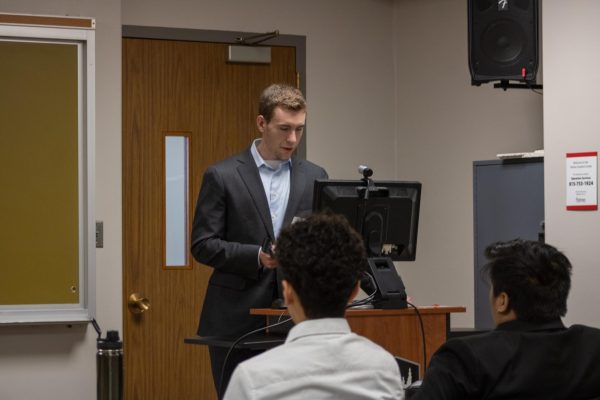‘The Hours’
February 27, 2003
Life is full of perfect moments. But what is a perfect moment? Perhaps it can occur with just the slight touch of a hand on your shoulder. Or maybe it’s that one moment when you knew that something you did affected somebody in an extraordinary way. Whatever it may be, for just that moment, you were truly happy.
“The Hours” flirts heavily with these moments, and they all seem to stem from the mind of its leading character, writer Virginia Woolf (Nicole Kidman). The plot is difficult to describe, yet refreshingly easy to understand. It’s broken down into three distinct stories, all of which are then woven together.
Woolf rejects confinement while she writes her novel “Mrs. Dalloway” in 1929. In 1951, Laura Browne (Julianne Moore) is struggling with feeling miserable in a picture-perfect life, finding solace in nothing but reading Woolf’s novel. In 2001, Clarrisa Vaughn (Meryl Streep) is caring for Robert Browne (Ed Harris), her author friend dying of AIDS, mainly because she’s too scared to care for herself. All three of these stories are intertwined, mainly through Woolf’s novel, in a way that is too much of a treat to reveal.
Sometimes films like these can seem cheesy and a bit too melodramatic. By “films like these,” I mean films whose characters spend ample amounts of time sobbing and very little laughing. These art house melodramas demand an audience to become emotionally attached to them. Some succeed and usually are showered with praises, while others fail and get laughs where they ask for tears.
As a melodrama, “The Hours” is a success. Just when it feels as if it is going too far, or asking for too much, it pulls itself back and lets you relax.
Screenwriter David Hale is responsible for this. He takes the original novel by Michael Cunningham and turns it into a free-spirited, completely sensible movie that explores human relations and sexuality. Just when we start to feel like we’re a bit lost, he throws something in to keep us on track with the plot. I must admit that I have not read the original novel, so I cannot comment on the success of Hale’s adaptation. But I will read it, and Hale’s work may inspire you to do the same.
So much of this film’s credit needs to be given to its editor, Peter Boyle II, who shows just what the profession is all about. The film begins with a rapid opening scene, where Boyle splices quickly from story to story. It’s a risky move that can either engage or distract an audience, but Boyle knows just how and when to make his cuts in order for them to appear seamless. This way, throughout the rest of the picture, we hardly can tell when we’re leaving one story and entering another.
There are plenty of good things to say about this film, from its great direction by Stephen Daldry to the remarkable performance by the unrecognizable Kidman.
Is this the best film of 2002? Probably not. Some will find it corny, some will find it sappy and some will find it a bit hokey – but most will not find it boring. “The Hours” takes it slow, yet it feels fast.
The film is bookended with death and packed full of life. Browne tells us “no matter what you start with, it always ends up being so much less.” Proving him wrong, you’ll walk out of “The Hours” with much, much more than when you walked in.













